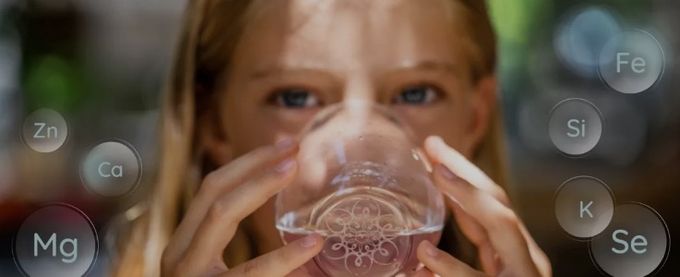Understanding the Minerals in Tap Water: What You Should Know
Updated February 11, 2025

Drinking water comes from natural sources like lakes, rivers, and underground water deposits. But before it makes its way to your tap, the water is processed at a treatment facility, where it gets filtered, and various chemicals are added to ensure it's safe for consumption.
It's important to understand the mineral composition of your drinking water to ensure that it is healthy. So let's get into more detail about the mineral content in tap water.
Does Tap Water Contain Minerals?
Yes, there are essential minerals in drinking water. They're beneficial to human health and support a variety of bodily functions, including maintaining strong bones and teeth, regulating muscle and nerve function, and maintaining fluid balance in the body.
The mineral content in tap water can vary depending on the source of the water and the treatment process at the water plant.
What minerals are in tap water?
Drinking water will contain all the minerals found in its source. In fact, some tap water is considered “hard water” because the mineral content in the water is higher. Some of the most common minerals found in tap water include calcium, magnesium, sodium, potassium, and trace minerals like iron, zinc, and manganese.
Additionally, for health and quality concerns, some minerals and chemicals are added at the water treatment facility. One of the minerals added to tap water is fluoride, which helps strengthen your teeth and prevent tooth decay by up to 25%.
Tap Water Mineral Content and Benefits
When it comes to minerals in tap water vs. bottled water, tap water typically has a higher mineral content. This includes calcium and magnesium, which are essential for strong bones and teeth, muscle and nerve function, and maintaining fluid balance in the body.
- Calcium: Teeth, bones, cell growth, and the production of hormones
- Magnesium: Bones, the metabolism, and the functioning of muscles
- Sodium: Regulating blood pressure and balancing bodily fluids
- Copper: Bone and connective tissue, the immune system, and blood clotting
There are a few other minerals found in trace amounts, including potassium, phosphorus, iron, selenium, zinc, and chromium.
Are Minerals in Tap Water Good for You?
Yes, the minerals found in water are usually healthy and aid in the basic functioning of the human body and overall well-being. Our bodies are unable to create these minerals on their own, so nutrient-rich water is an important part of a healthy diet.
Water that is low in minerals won't be as effective in terms of hydration. Also, the minerals in the water contribute to the overall health of the heart, as they are responsible for lowering blood pressure and regulating blood flow.
However, the contents of your tap water don't only depend on its source and quality control, but on the overall condition of the plumbing system. That's why many decide to take extra precautions and filter their water to ensure the right composition of healthy drinking water.
Does Filtered Tap Water Have Minerals?
No, it doesn't. Filtering water reduces its contents to their basic form, not only removing contaminants but minerals as well. Drinking water that is low in mineral content is generally not good for your health, so it's crucial you remineralize your water after the filtration process is done. Products like Essential Mineral Drops by Mayu Water can make your water nourishing and healthy again.
Infuse the Life Back Into Your Water
Mayu Essential Mineral Drops is a 100% natural mineral supplement for filtered water.
- Taps the source: Holds the mineral composition of the best natural springs.
- Rich in nutrients: Each drop contains 75 essential minerals.
- All natural: No added preservatives, flavors, sugars, or sweeteners.
- Eco-friendly: Do away with bottled mineral water and reduce plastic waste.
Essential Mineral Drops by Mayu Water are the result of the analysis of the best water springs found in nature. It not only adds back essential water minerals like magnesium, chloride, and sodium but also 72 ionic organic trace minerals in varying amounts.
Does Filtering Tap Water Make It Healthier?
It usually does, since besides organic and added minerals, the full composition of tap water may contain various unwanted trace elements as well.
Did you know?
The Flint water crisis was caused by lead contamination, as lead pipes are still widely in use across the US, which is why many water treatment facilities add phosphate to ensure maximum safety.
For many, drinking unpurified tap water is not a risk they are willing to take. Taking additional measures, such as filtering, means gaining full control of the contents of your glass.
Do You Remove Minerals in Water by Boiling It?
The general answer is no. Boiling water can help to kill any harmful bacteria in tap water, but even if the water is boiled to over 212 degrees Fahrenheit, it won’t destroy or remove any of the minerals.
How to Remineralize Filtered Water
There are many ways of adding back minerals to your water, ranging from water filters to more cost-effective solutions like Himalayan salt. The natural mineral balance of spring water can be difficult to recreate, which is why many choose to use mineral supplements, making it easier to know exactly what they're adding to their water.
Making the Most Out of Tap Water
Tap water is generally considered safe to drink. However, many people prefer to filter their water to remove contaminants and bacteria and then remineralize it themselves.
One of the easiest and healthiest ways to remineralize your drinking water is by using Mayu’s Essential Mineral Drops, which are a rich, concentrated blend of essential minerals to supplement the water you drink throughout the day.













































